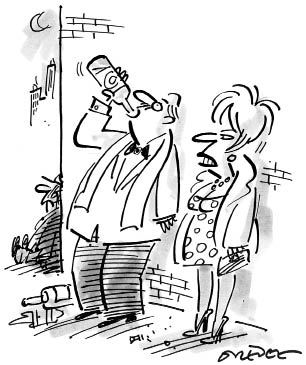‘We’re women, not ladies,’ the Women’s Libber, still in campaigning mode after 40 years, reminded us sharply.
‘We’re women, not ladies,’ the Women’s Libber, still in campaigning mode after 40 years, reminded us sharply. She was for the first time in the same room as Peter Jolley, who had helped to organise the notorious 1970 Miss World contest. He, too, does not seem to have changed much in the intervening decades. ‘So much work went into it, my dear,’ he insisted, riling his fellow conversationalists, perhaps deliberately.
Twenty-five billion viewers switched on to watch the event at the Royal Albert Hall as 58 ‘girls’ from around the world were set up like prize specimens and assessed for beauty, personality and demeanour. On this occasion, though, another group of ‘girls’ had decided they’d had enough of women being exploited for commercial gain and smuggled into the hall in their ‘handbags’ an armoury of smoke bombs, rotten tomatoes and ‘limp lettuce’ to disrupt the competition and expose its iniquities. They were arrested and the broadcast resumed, but only after the world had witnessed the fracas. In those days ‘live’ TV meant live.
Sue MacGregor brought together three of the Libbers with those who had taken part in the contest for another gripping session of The Reunion (Radio 4, Sunday). It’s a perfect radio scenario: a group of people who once witnessed or took part in an extraordinary event, sitting around a table and reliving its tensions and dramas by talking about what they can remember. In this week’s programme (produced by Christina Captieux) the friction between the two opposing camps was palpable, even now so many years later when you would have thought most women had achieved a degree of liberation.
‘A smack on the bum, get out there — and smile,’ said Jolley, unable to stop himself from recalling what he had told Miss Africa South when she hesitated timidly before going out on stage. Michael Aspel, too, who compèred the evening with his customary suave chivalry, kept talking about the ‘Girls’, and assured us that his fellow guest, Jennifer Hosten, the former Miss Grenada, who had won that night, ‘looks as beautiful now as she did 40 years ago’. A semi-audible hiss emitted from my radio as the Libbers collectively drew breath.
The previous night we had heard again the strident tones of Barbara Castle, who with her flame-red hair and neatly cropped suits was never a Libber. She preferred to tackle women’s issues, especially equal pay, using different tactics, learnt perhaps from her father, who taught her how to smoke when she was 16. ‘Turn your lips in and learn to smoke dry,’ he insisted, disgusted that on her first attempt she’d soaked the cigarette.
It was great to hear her again, in full flow, belting out her political beliefs. In Archive on 4 her biographer, Anne Perkins, reminded us how like Margaret Thatcher she’d been, turning being a woman into an asset, and never afraid to flaunt her sexuality. As Betty Boothroyd who was once her parliamentary secretary recalled, ‘She used her brains, her glamour, she used everything to get what she wanted.’ For Barbara, an appointment with her hairdresser was as important as the next Cabinet meeting. But she never let this undermine her serious purpose: ‘to make the good life available for everyone’.
This being the late 1960s, when the Miss World contest was at its height, she was never allowed to forget that she was a woman daring to play a man’s game. When, for instance, she was appointed minister for transport in the Wilson Cabinet, she was told by a political interviewer, ‘You’re only a woman. You don’t drive. What do you know about it?’ To which Barbara replied, majestically, ‘Hah!’
Did she ever suffer from self-doubt? ‘Women’s great failing is lack of arrogance,’ she said. ‘We don’t cast ourselves high enough.’ Too right.






Comments